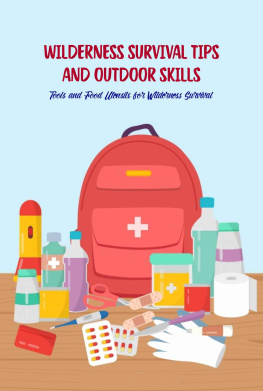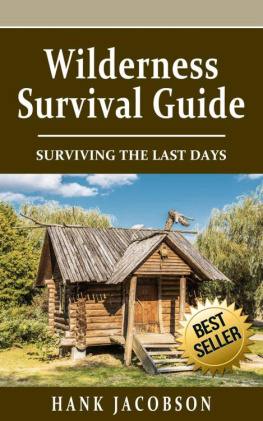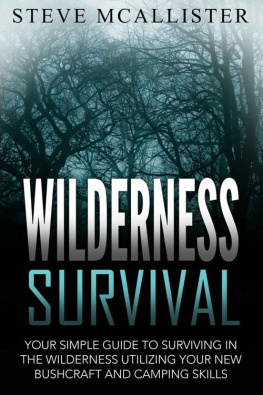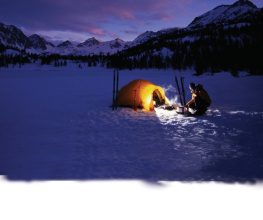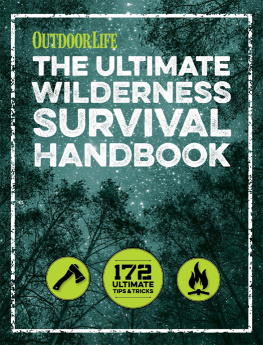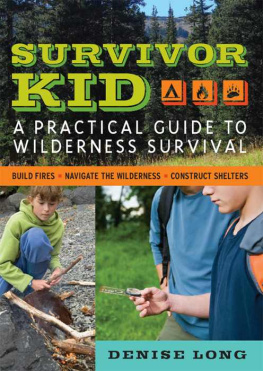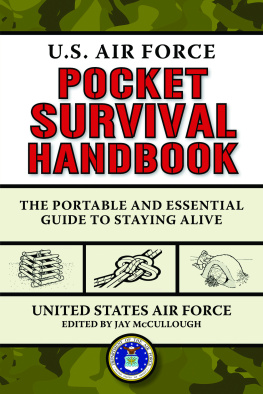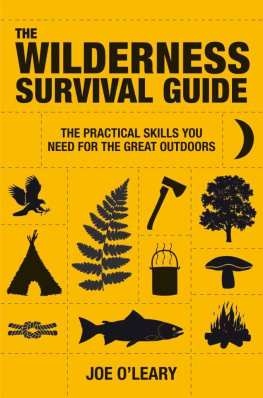

Copyright 2006 Gregory J. Davenport
Published by
STACKPOLE BOOKS
5067 Ritter Road
Mechanicsburg, PA 17055
www.stackpolebooks.com
All rights reserved, including the right to reproduce this book or portions thereof in any form or by any means, electronic or mechanical, including photocopying, recording, or by any information storage and retrieval system, without permission in writing from the publisher. All inquiries should be addressed to Stackpole Books, 5067 Ritter Road, Mechanicsburg, PA 17055.
Printed in the United States
10 9 8 7 6 5 4 3
Although Wilderness Survival provides extremely valuable information, it cannot guarantee survival. Misuse of some of the information in this book may lead to both physical and equipment damage, for which the author disclaims any liability.
Cover Design by Caroline A. Stover
Illustrated by Steven Davenport and Ken Davenport
Library of Congress Cataloging-in Publication Data
Davenport, Gregory J.
Wilderness survival / Gregory J. Davenport. 2nd ed.
p. cm.
Includes index.
ISBN-13: 978-0-8117-3292-5 (alk. paper)
ISBN-10: 0-8117-3292-4 (alk. paper)
1. Wilderness survivalHandbooks, manuals, etc. I. Title.
GV200.5.D38 2006
613.69dc22
2005036234
This book is dedicated to the
USAF SERE
(Survival, Evasion, Resistance, & Escape) cadre
especially Gary Herman, Robert Milks, Joe Sitterly,
Rick Arnold, and William Frye.
Contents
Introduction
The elk hed been tracking was nowhere in sight; he wondered why hed kept following it for so long. Less than forty-eight hours ago, hed been comfortably sleeping in a warm king-size bed. Now he lay in a fetal position under a sparsely covered pine tree. The tree provided little protection from the cold, damp snow that flurried around him. His clothes were soaked. He was shivering and couldnt seem to stop.
Earlier attempts at starting a fire had failed when his wet matches wouldnt light. Why didnt I carry more emergency survival gear? he asked himself. Before leaving the comforts of home, hed filled his car with all the modern camping necessities: a large Coleman stove, an ornate kerosene lamp, a colorful expensive tent, and a top-of-the-line down sleeping bag. He hadnt bothered to pack an emergency survival or first-aid kit. He had never needed one before.
For Mark, the day had started like so many others. At 5 A.M. his friend Jake could be heard rustling around the camp, breaking wood and starting a fire. He counted on Jake to build a hair-singeing fire every morning. Jake loved fires so much that Mark often wondered if he was a closet pyromaniac. He didnt use matches, opting to use a metal match instead. Mark thought it seemed silly to use such a primitive device when both matches and lighters were available. But Jake, sticking true to his convictions, often said, Matches and lighters run out, but a metal match will last forever. Secretly, Mark often wished he had Jakes talent for building fires.
Mark hated getting out of his sleeping bag in the morning, especially on a cold day like this. He waited until the fire crackled and then jumped from his bag and ran toward it as fast as his bare feet could safely take him. Sitting on a wet, cold log, Mark attempted to put on his socks and boots. The leather boots had been left out all night. They were slightly frozen and stiff, and he was unable to get them over his thick wool socks. Although he knew better, Mark decided to wear a thin pair of cotton socks that hed brought along for the ride home. He was sure they wouldnt get wet.
Breakfast was quicka peanut butter-and-jelly sandwich washed down with a coffee mug full of beer and tomato juice, a long-standing tradition. After eating, Mark began packing his gear. Staying close to the fire in order to keep warm, he organized a small fanny pack full of all the things he felt were necessary for a day of hunting: a bag of red licorice, four granola bars, matches, ammunition, a knife, and a quart of water. Mark always traveled light, believing it was necessary to conserve his strength to pack out the elk he intended to kill. He would laugh at Jake, who carried a small summit pack full of gear; it seemed unreasonable to carry so much.
Mark said good-bye to Jake as he left camp, feeling high on the morning air and sure today would be his day to return with an elk in tow. When Jake asked for his itinerary, Mark said he was going to play it by ear and really didnt have any special plans for the day. He felt so comfortable with his knowledge of the surrounding terrain that he didnt even carry a map or compass. He often bragged about this to his friends and made fun of them for carrying a compass and map into the same old forest where theyd hunted for so many years.
Within minutes of departing camp, Mark spotted a majestic seven-point elk feeding on the dew-fresh grass of a nearby meadow. Caught unprepared, he was unable to chamber a round before the elk spooked and cascaded into the surrounding forest. Sure of his tracking skills, he excitedly headed into the woods after the evasive creature. Several hours of searching passed before Mark stopped and suddenly realized hed lost track of his location. Unwilling to abandon the hunt, he decided to continue until 3 P.M. If he was unable to locate the elk by then, he thought, hed get to high ground and look for a familiar landmark by which to find his way back to camp.
At around 2 P.M. , the weather began to change drastically. The temperature quickly dropped below freezing, and a thick fog descended. Mark felt as if hed been placed inside a large cooler without lighting or windows; the cold air was bone-chilling, and he couldnt see more than five feet ahead of him. The elk hed been tracking was long gone. He was still unaware of his present location, and as there were no visible landmarks, the way back to camp was uncertain. Shortly after the fog settled, Mother Nature decided it was time to show her teeth and delivered an unyielding downpour of rain and snow. Mark wished he had brought his rain gear. As the temperature continued to drop, Mark started to sense his predicament and began to frantically wander around in circles looking for a landmark or any sign of his hunting party. Panic began to set in, and the rhythmic beat of his pounding heart was so loud he thought his head would explode.
Darkness fell. In an attempt to alert his comrades of his desperate situation, Mark fired three rounds from his rifle every five minutes until his ammunition was gone. Cold, wet, and freezing, he crawled under a large lodgepole pine and tried to keep warm, but to no avail. His attempts to build a fire failed because his matches had become wet. He had no matches, no fire, no change of clothing, no navigational tools, and no improvising skills with which to meet his needs.
Crying and scared, he recalled how hed read of a hiker who had died two years earlier from the effects of hypothermia while camping under conditions similar to these. When reading the article, hed wondered how it could have happened and questioned the experience of the hiker. He now understood his own vulnerabilities and wished hed been better prepared. As the hours passed, hypothermias overwhelming cloud began to take hold, and Mark started drifting off to sleep. His thoughts became peacefulwondering if his family would miss him; if his body would be found before Christmas; and if another hunter might read of his death and question, as hed done of the hiker, his experience as a wilderness traveler.


